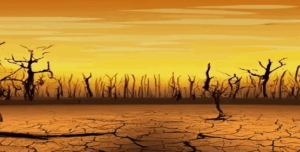You should be aware that climate change is seriously affecting agriculture, according to agricultural specialists
Climate Change’s Impact on Agriculture: The impact of climate change is becoming increasingly evident in agricultural sectors as well. In regions where groundwater used to be accessible at 100 feet or less, individuals now need to bore significantly deeper wells to obtain water. Furthermore, climate change is also influencing farming practices, with the soil quality deteriorating compared to previous years.

Various reports highlight the repercussions of climate change on agriculture in India, such as erratic rainfall patterns, escalating temperatures, water scarcity, and rising sea levels. These factors are adversely affecting agricultural output by damaging crops, diminishing yields, and leading to the emergence of new diseases and pests. Moreover, water shortages are complicating irrigation processes, while the encroachment of saline water in coastal regions is reducing arable land.
Consequences
Farmers are encountering reduced yields and financial setbacks due to irregular and extreme weather conditions. The unpredictability of the future is mounting, posing challenges for farmers in devising long-term plans.
Decrease in crop production
Media outlets report that agricultural challenges resulting from climate change include soil erosion, disruptions in crop cycles, and difficulties in pest management. Employing traditional techniques like crop rotation and intercropping can assist in mitigating these challenges. Climate change not only diminishes crop yields but also contributes to nutrient deficiencies. Government projections suggest that without intervention, rice productivity could decline by 20% and wheat productivity by 19.3% by 2050. Similarly, maize yields are anticipated to drop by 18%.
Importance of afforestation
Agricultural expert Dr. Akanksha Singh emphasized the escalating temperatures due to deforestation and its adverse effects on agricultural lands. Deforestation leads to the emission of gases that contribute to global warming, resulting in the melting of glaciers. To combat these issues, it is imperative to plant trees extensively. This practice not only maintains the fertility of agricultural lands but also helps alleviate problems such as heatwaves.

